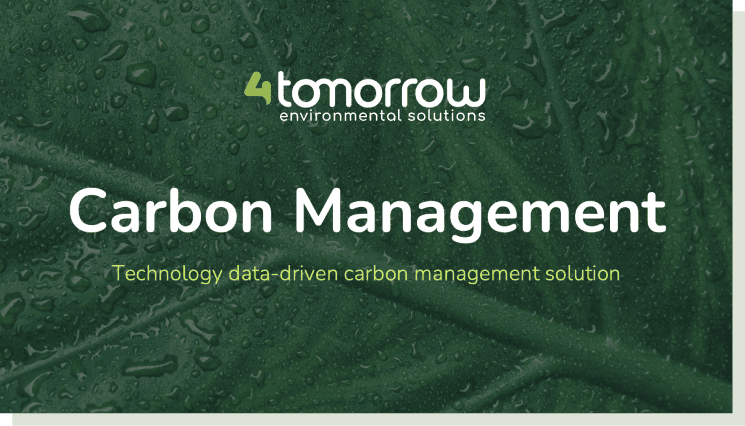Resources
Frequently asked questions
Why should I choose 4tomorrow?
- Affordable monthly subscription.
- Simplify meeting rapidly expanding environmental disclosure requirements.
- Stay future-proof against emerging regulations and market shifts.
- Pinpoint decarbonisation opportunities customised to your business.
- Access the latest methodologies and climate science without adding headcount to your business.
- Set ambitious science-based targets and track measurable reduction progress.
- Benefit from our detailed focus and understanding of your scope 3 (vendor) emissions.
- Gain access to high-quality carbon offsets at wholesale prices.
What is carbon accounting?
Why should I know my carbon footprint?
Understanding your carbon emissions using the most up-to-date data and methods allows your organisation to mitigate risks, realise efficiencies, set science-based goals, and capture competitive advantage. By taking definitive climate action today, you can secure a resilient future while building trust and transparency.
What is carbon offsetting?
Carbon offsetting involves compensating for difficult-to-eliminate carbon emissions by purchasing third-party verified carbon credits.
These credits fund external projects that actively reduce, avoid, or remove emissions, counterbalancing the emitter’s residual emissions.
Offsetting enables organisations to mitigate their unavoidable emissions as they transition strategically towards comprehensive decarbonisation and a net-zero future. It serves as an interim emissions balancing mechanism while internal abatement capacity advances.
Why should I offset my business carbon footprint?
There are multiple reasons for choosing accredited offsets. Offsetting helps businesses:
- Cost-effectively counterbalance unavoidable emissions.
- Achieve near-term carbon neutrality while their decarbonisation strategy scales.
- Showcase their sustainability commitment to customers and stakeholders.
- Unlock market incentives, such as carbon-conscious consumers.
- Stay ahead of impending offset regulations and requirements.
- Generate additional social value for their company.
How does 4tomorrow measure emissions?
At 4tomorrow, we use the guidance of the GHG protocols to assess data supplied by our clients. We employ a mixture of spend-based (e.g. financial transactions) and activity-based (e.g. distance travelled) approaches. We then apply emissions factors from various reputable sources to calculate a carbon emission equivalent (CO2e).
How does 4tomorrow protect my data?
We prioritise the security and privacy of our clients’ data. We follow industry best practices and comply with relevant data protection standards to ensure the confidentiality, integrity, and availability of your data. Our commitment is to safeguard your information throughout our processes.
What is the difference between Carbon Neutral & Net Zero?
Both are focused on emissions reduction as a priority however, Carbon Neutral allows for the carbon offsetting of hard to reduce or unavoidable emissions.
Carbon Neutral: It involves offsetting operational emissions that cannot yet be eliminated internally by purchasing Carbon Offsets to achieve net-zero emissions on paper. Offsets play an important transitional role until permanent solutions can be fully implemented.
Net Zero: Net zero aims to reduce value chain emissions down to near zero through aggressive decarbonisation of operations, energy supply, transportation, etc. Being net zero means significantly cutting internal emissions through business transition.
Why is carbon accounting important?
Carbon accounting is vital as it helps businesses and consumers understand their carbon footprint. By measuring emissions, organisations can identify the largest sources and opportunities for reducing impact through efficiency improvements, renewable energy, carbon offsets, and other options. Tracking emissions is key for reporting and setting meaningful reduction targets in line with climate goals.
What methodologies do you use for carbon accounting?
We utilise best-practice carbon accounting approaches, such as the Greenhouse Gas Protocol. Our methods include setting organisational and operational boundaries, tracking emission sources based on a scope framework, using accurate emissions factors for conversion calculations, and addressing uncertainties. Staying up to date with the latest international standards is a cornerstone of our business
What can organisations use carbon accounting data for?
- Setting emission baselines and reduction targets
- Identifying carbon risks and opportunities
- Implementing emissions reduction projects
- Reporting emissions to stakeholders
- Informing product eco-labelling
- Supporting responsible investment and procurement choices
- Engaging staff around impact
- Declaring net zero commitments
What services do you offer?
At 4tomorrow, we provide end-to-end support services for carbon measurement, reporting, and management. Our services include:
- Carbon footprinting baseline analyses.
- Regular emissions tracking and reporting.
- Verification of carbon inventories and footprints.
- Advice to reduce your organisation’s carbon impact through renewables, efficiency, and beyond.
- Carbon offset guidance.
